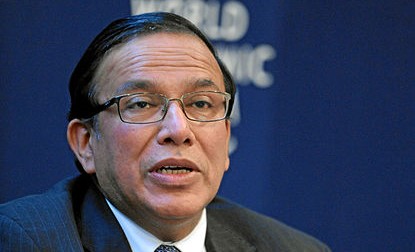
Arrest of former SBI chief in NPA sale case: where do the parties stand?

Former State Bank of India (SBI) chairman Pratip Chaudhuri was on Monday sent to 14-day judicial custody after his arrest a day earlier for an alleged fraud involving the sale of a hotel when the company defaulted on a loan.
On the day of his arrest, the Ministry of Finance issued norms to guide public sector banks in adopting a uniform staff accountability framework for non-performing asset accounts (NPAs) up to ₹50 crore. The step was taken to protect bankers when legitimate business decisions go wrong and lead to NPAs.
The Department of Financial Services, under the ministry, “vide its order dated October 29 advised broad guidelines to be adopted by all public sector banks on ‘Staff Accountability Framework for NPA Accounts up to ₹50 crore’ (Other than Fraud Cases)”, the Indian Banks’ Association (IBA) said in a statement. Banks have been advised to revise their staff accountability policies based on these guidelines and frame the procedures with approval of the respective boards, the IBA said.
At present, different banks follow different procedures for conducting staff accountability exercises, which are carried out in respect of all accounts that turn NPAs.
“This approach not only adversely affects staff morale but also puts a huge strain on the bank’s resources. While punitive action need to be taken against the officers having malafide intent/involvement, it is essential to ensure that bonafide mistakes are dealt with compassion. There is a need to protect the people taking bonafide business decisions in this competitive environment,” the IBA said.
Police Charges
Pratip Chaudhuri was arrested in a case relating to a hotel project, Garh Rajwada, in Jaisalmer, which was financed by the SBI in 2007. The project, promoted by the Godawan Group, remained incomplete for over three years and the account slipped into NPA in 2010, the SBI said.
Chaudhuri retired as SBI chairman after a two-year term in September 2013. The next year, he joined the board of Alchemist Asset Reconstruction Company, to which the hotel was later sold to recover the bank’s money.
SBI is accused of selling properties worth ₹200 crore to Alchemist ARC for only ₹25 crore after seizing them for default on a ₹24-crore loan.
Chaudhuri is “accused under Indian Penal Code sections 420 (cheating and dishonestly inducing delivery of property), 409 (criminal breach of trust by public servant, or by banker, merchant, or agent), and 120B (criminal conspiracy)”, the police said.
SBI Statement
The bank said: “All due processes were followed while making the said sale to the ARC.
“Various steps taken by the bank for completion of the project as well as recovery of the bank’s dues didn’t yield the desired results.”
As part of the recovery efforts, the dues were assigned to an ARC in March 2014, it said. The sale was done through an established process, the statement said.
“We further understand that the borrower was subjected to IBC (Insolvency and Bankruptcy Code) process by the said ARC and the asset has been acquired by an NBFC (non-banking financial company) in December 2017, again through due process under the orders of NCLT (National Company Law Tribunal), Delhi.”
After recovery efforts failed, approvals for sale to the ARC were taken in January 2014, and the sale was completed in March the same year, it said.
“It transpires now that the borrower had initially filed an FIR with the state police against the sale of assets to ARC. It appears from the copies of the proceedings now accessed by us that the court does not appear to have been briefed correctly on the sequence of events. In as much as SBI was not a party to this case, there was no occasion for the views of SBI being heard as part of this proceedings,” SBI said.
“Aggrieved against the negative closure report filed by police authorities, the borrower had filed a ‘protest petition’ before the CJM court. Incidentally SBI was not made a party to this case,” the bank added.


